Artistic freedom and working conditions are the CCS’ first two out of ten priorities highlighted in the discussion paper ‘Towards the Culture Compass: A Sector Blueprint’, published by Culture Action Europe and co-created by 30 cross-border European cultural networks.
The Blueprint aims at “providing constructive input for shaping the future of cultural policies in Europe”, while the Commission's Culture Compass is expected in November 2025.
The ten priorities discussed are backed with context and specific proposals per policy brief. Contributed by different CCS organisations, the policy briefs acknowledge shared hopes and concerns on strengths and challenges ahead, and reaffirm the principles advanced over time in CCS claims and in Culture Action Europe’s: Ask, Pay, Trust the Artist campaign.
CAE will present the Blueprint discussion paper on 2 October. To follow the online presentation register here.
A Vision for Culture as a Strategic Priority but not Instrumentalised
Main focus areas include establishing "access to culture and cultural participation as a fundamental right" and foundational element of democratic and civil infrastructure, while strengthening cultural democracy both online and offline. CCS representatives call for mutual learning and clarification of definitions and common metrics for stronger analysis tools and evidence-based policy arguments, such as by establishing an Artistic Freedom Observatory, a Culture and Well-being Observatory, a Cultural Democracy Index and a Common European Data Space for Cultural Heritage.
Blueprint authors argue for stronger EU-level protections on urgent issues, such as an Artistic Freedom Act and a Directive on Decent Working Conditions in the Cultural Sector. They focus on the next Multiannual Financial Framework 2028-2034 aiming at “a visible and well-resourced Creative Europe – Culture Strand within the proposed AgoraEU programme”, complemented by an overall architecture of structural culture components in other funding instruments, such as the European Competitiveness Fund, Horizon Europe, Global Europe Fund, National and Regional Partnership Plans, among others.
CCS authors overall recognise a key position of an EU cultural policy in international cultural relations amid global tensions and conflicts, as “a way for the EU to act as a global partner focused on mutual benefit and reciprocity”.
CCS contributions share a vision of setting culture as a strategic priority, including as a standalone Sustainable Development Goal and through synergies with other EU policy priorities. However, caution against instrumentalisation of culture is a common concern, emphasizing on ensuring: artistic freedom, fair working conditions, and public support as preconditions to any meaningful contribution of culture to “democracy, security and competitiveness”.
The ten priority areas include 1) artistic freedom; 2) working conditions; 3) artistic research, culture and innovation; 4) international cultural relations; 5) culture and health and well-being; 6) culture and sustainability; 7) cultural participation; 8) access to cultural and arts education; 9) culture and security; 10) culture and digital. Highlights of the CCS proposals on the priority topics are summarized below.
1) Artistic freedom
 The artistic freedom policy brief calls for integrating artistic freedom in the Rule of Law report, establishing a European Observatory on Artistic Freedom and developing an artistic freedom index. Proposed measures include as well the development of EU legislation towards an Artistic Freedom Act, the establishment of a funding mechanism supporting CCS professionals facing artistic freedom restrictions and introducing respect for artistic freedom as a formal condition for receiving EU funding.
The artistic freedom policy brief calls for integrating artistic freedom in the Rule of Law report, establishing a European Observatory on Artistic Freedom and developing an artistic freedom index. Proposed measures include as well the development of EU legislation towards an Artistic Freedom Act, the establishment of a funding mechanism supporting CCS professionals facing artistic freedom restrictions and introducing respect for artistic freedom as a formal condition for receiving EU funding.
2) Working Conditions
Blueprint experts propose the development of a Charter on Working Conditions, composed by modular Framework and a multi-annual Consultation process, with the principles of Fair Pay - Fair Share - Fair System cutting across all topics of the Charter.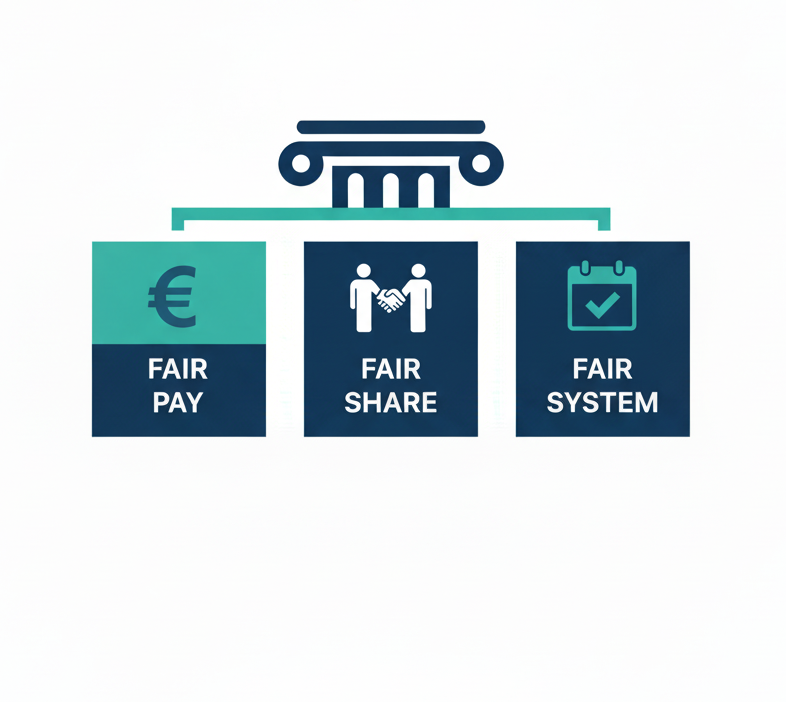
Blueprint writers prioritize a clear definition of CCS professionals under the Framework’s scope, as well as measures for fair pay, labour relations, social security and taxation. Key steps for the Consultation include the launching of an Expert Working Group and the implementation of several rounds of consultation with international and national artists’ organisations, social partners, and other European networks.
3) Artistic research, culture and innovation
Authors call for the full recognition of artistic research and doctorates in the arts as an official and independent knowledge domain in the European Research Area and in Horizon 2028-2034. They propose integrating creative skills in the Union of Skills and the European Skills Intelligence Observatory.
They promote a trans-versal approach focusing on synergies, involving the Commission’s portfolios in a recurring forum named Creative Innovation Dialogues, and linking creatives with innovation, as a strategic growth asset in the European Competitiveness Fund.
4) International Cultural Relations
Blueprint authors suggest integrating international cultural relations in a wider holistic Culture Compass and mainstreaming culture as a strategic priority in EU external action. They find a valuable asset in the “experienced and diverse European stakeholders and networks in international cultural relations", and call for strengthening coordination and breaking down institutional silos. They highlight systemic barriers to overcome in order to ensure inclusivity, accessibility, fairness and ethics of solidarity as underlying principles of international cultural relations.
5) Culture and health and well-being
 Authors propose an EU Recommendation on Cultural Participation as a Determinant of Health and Social Well-being and call for international collaboration with the WHO to integrate arts in the healthcare systems. They suggest for culture-sensitive Eurostat metrics to measure individual "individual and collective well-being including identity, belonging, trust, intergenerational exchange and civic engagement", and propose the establishment of EU-level Observatory of existing bodies to synthetise evidence and develop common frameworks.
Authors propose an EU Recommendation on Cultural Participation as a Determinant of Health and Social Well-being and call for international collaboration with the WHO to integrate arts in the healthcare systems. They suggest for culture-sensitive Eurostat metrics to measure individual "individual and collective well-being including identity, belonging, trust, intergenerational exchange and civic engagement", and propose the establishment of EU-level Observatory of existing bodies to synthetise evidence and develop common frameworks.
6) Culture and sustainability
Experts propose 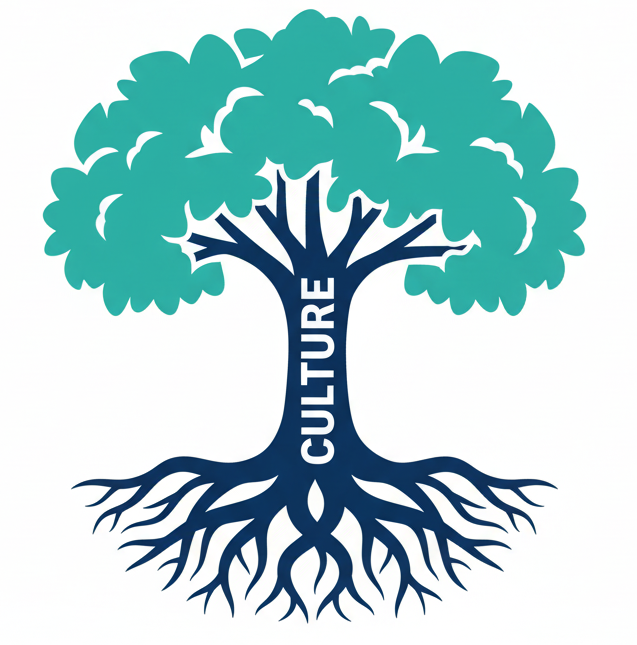 treating the climate crisis as a cultural crisis and recognising culture as a standalone Sustainable Development Goal in the post 2030 framework. They call for embedding culture in the European Green Deal and for a clear green priority in the upcoming AgoraEU, supported by adequate dedicated budgets, including realistic common standards and building on resources, such as the SHIFT eco-certification for networks and the Theatre Green Book for the Performing Arts.
treating the climate crisis as a cultural crisis and recognising culture as a standalone Sustainable Development Goal in the post 2030 framework. They call for embedding culture in the European Green Deal and for a clear green priority in the upcoming AgoraEU, supported by adequate dedicated budgets, including realistic common standards and building on resources, such as the SHIFT eco-certification for networks and the Theatre Green Book for the Performing Arts.
7) Cultural participation
Blueprint writers recognise "cultural democracy, including participatory arts, as a driver of imagination and foresight in EU policies, (including initiatives like the New European Bauhaus, the Climate Pact and EU Youth Platforms)”, while clarifying that beyond access or inclusion, participatory art is “a way to co-create future narratives and mobilise imagination, collective memory and public space”. Among their various proposals, highlights include the launching of an EU-wide programme aiming at capacity building for cultural participation, including on how to participate in EU-funded projects, especially aiming to help local organisations of limited resources.

8) Access to cultural and arts education
Authors suggest among others to affirm cultural and arts education as a universal right, include support for art teachers in the EU Teachers and Trainers Agenda (2026), and introduce a ‘Cultural Democracy Index’ to track access, participation, and empowerment in cultural and arts education across member states. Proposed actions include youth participation, inclusive digital strategies and community-led projects to support context-sensitive, grassroots cultural and arts education projects.
9) Culture and security
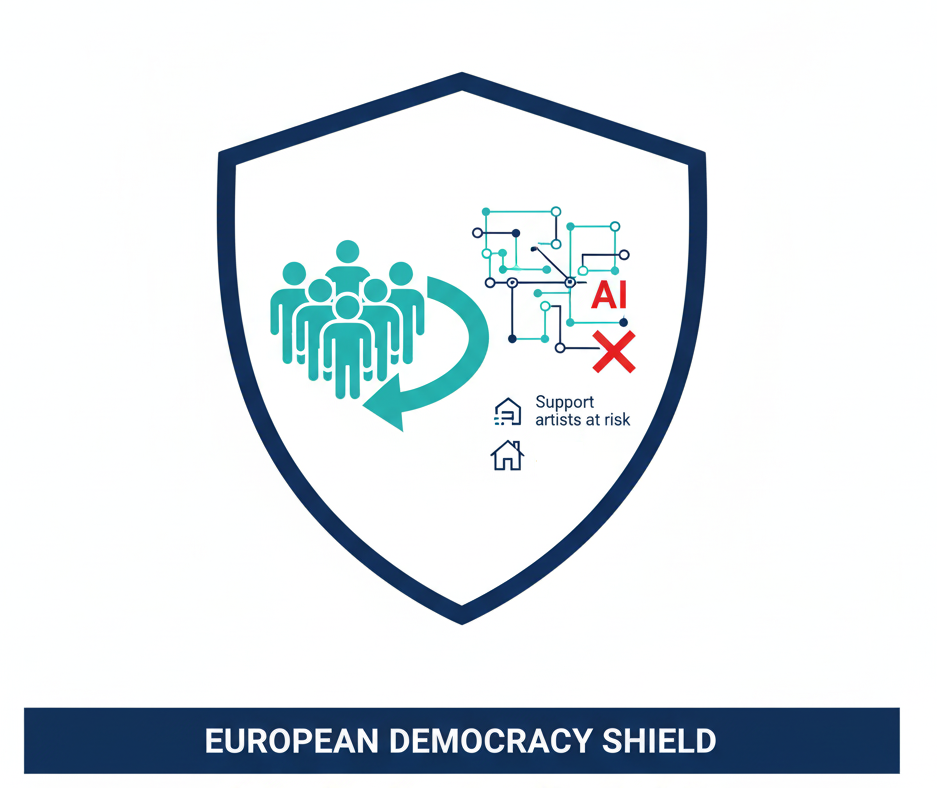 Authors advocate for recognising cultural participation as a strategic pillar of the European Democracy Shield to counter disinformation and manipulation while promoting democratic values. They call for CERV+ dedicated funding on cultural participation and European content creation. They highlight the need for clear labelling of AI-generated content and deepfakes, to avoid embedding authoritarian narratives in AI systems. Their proposals include allocating 2% of Russia’s frozen assets for the cultural recovery of Ukraine and an EU pilot scheme for at-risk and displaced artists and workers in the cultural and creative sectors.
Authors advocate for recognising cultural participation as a strategic pillar of the European Democracy Shield to counter disinformation and manipulation while promoting democratic values. They call for CERV+ dedicated funding on cultural participation and European content creation. They highlight the need for clear labelling of AI-generated content and deepfakes, to avoid embedding authoritarian narratives in AI systems. Their proposals include allocating 2% of Russia’s frozen assets for the cultural recovery of Ukraine and an EU pilot scheme for at-risk and displaced artists and workers in the cultural and creative sectors.
10) Culture and digital
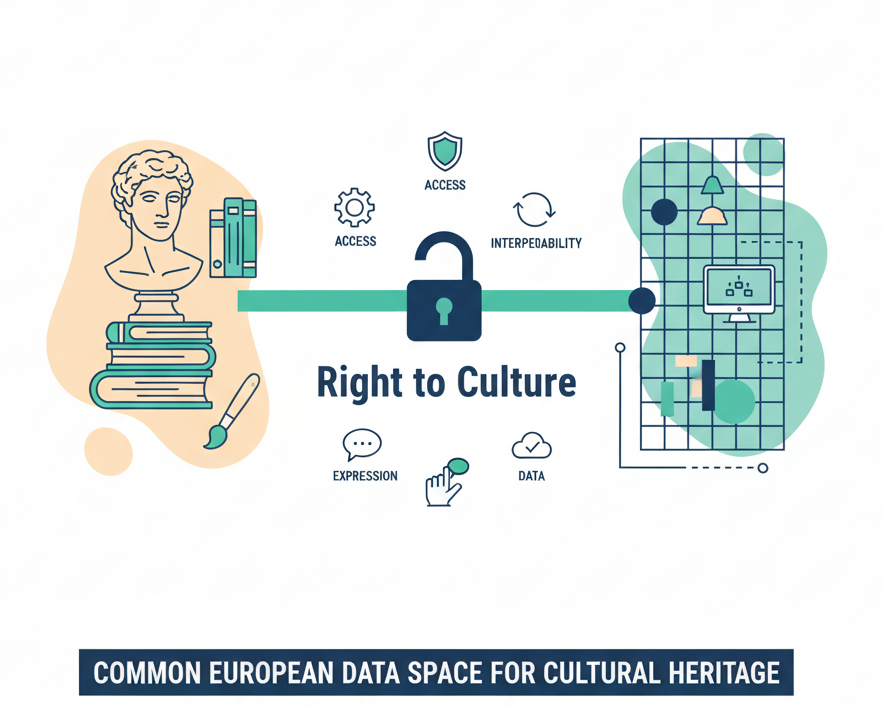
Authors call for establishing
cultural rights in both the offline and online realms, and add the ‘right to culture’ as a new principle in the
Digital Decade, along with the
six digital rights in the European Declaration on Digital Rights and Principles.
While calling for closing the digital and AI skills divide for cultural professionals, the authors suggest protecting analogue practices as a valued part of a pluralistic, healthy cultural ecosystem. Authors advocate for protecting heritage with both physical and digital means and require that all digitised content is routed to the
Common European Data Space for Cultural Heritage via national and thematic aggregators. They call for adequate protection of authorship and fair remuneration in an AI world, highlighting gaps on transparency and accessibility mechanisms for consent and compensation going beyond opt-out options.
A collaborative effort of 31 CCS representatives
The discussion paper was created following months of dialogues with the EU institutions and with the contribution of the following CCS organisations.
Find more here
Images generated with Chat GPT.








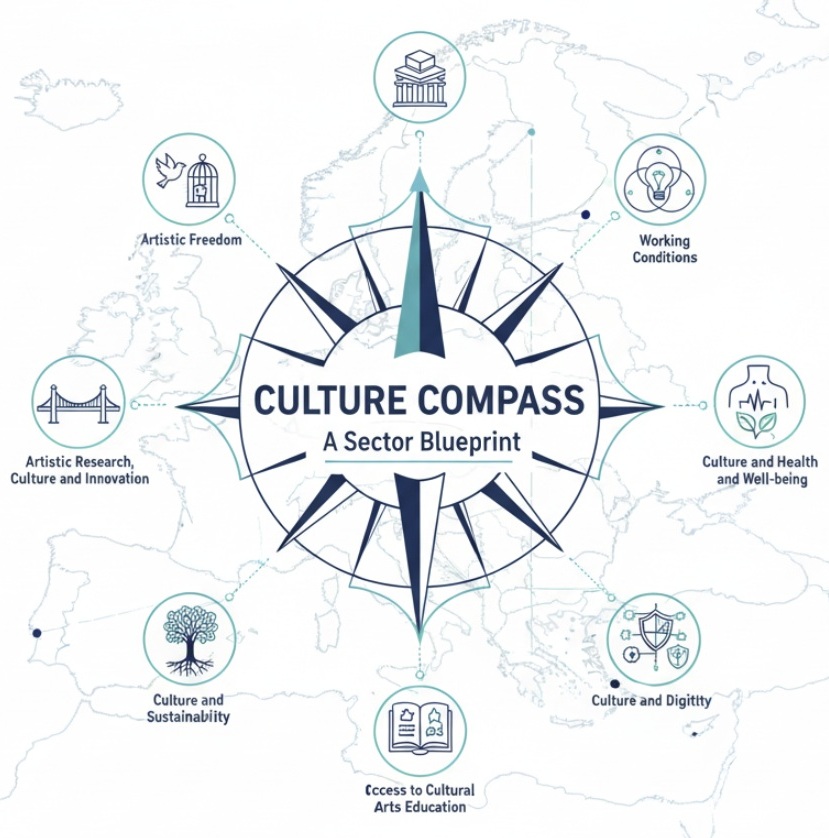
 The artistic freedom policy brief calls for integrating artistic freedom in the Rule of Law report, establishing a European Observatory on Artistic Freedom and developing an artistic freedom index. Proposed measures include as well the development of EU legislation towards an
The artistic freedom policy brief calls for integrating artistic freedom in the Rule of Law report, establishing a European Observatory on Artistic Freedom and developing an artistic freedom index. Proposed measures include as well the development of EU legislation towards an 

 treating the climate crisis as a cultural crisis and recognising
treating the climate crisis as a cultural crisis and recognising 
 Authors advocate for recognising cultural participation as a strategic pillar of the European Democracy Shield to counter disinformation and manipulation while promoting democratic values. They call for CERV+ dedicated funding on cultural participation and European content creation. They highlight the need for clear labelling of AI-generated content and deepfakes, to avoid embedding authoritarian narratives in AI systems. Their proposals include allocating 2% of Russia’s frozen assets for the cultural recovery of Ukraine and an EU pilot scheme for at-risk and displaced artists and workers in the cultural and creative sectors.
Authors advocate for recognising cultural participation as a strategic pillar of the European Democracy Shield to counter disinformation and manipulation while promoting democratic values. They call for CERV+ dedicated funding on cultural participation and European content creation. They highlight the need for clear labelling of AI-generated content and deepfakes, to avoid embedding authoritarian narratives in AI systems. Their proposals include allocating 2% of Russia’s frozen assets for the cultural recovery of Ukraine and an EU pilot scheme for at-risk and displaced artists and workers in the cultural and creative sectors. Authors call for establishing cultural rights in both the offline and online realms, and add the ‘right to culture’ as a new principle in the
Authors call for establishing cultural rights in both the offline and online realms, and add the ‘right to culture’ as a new principle in the